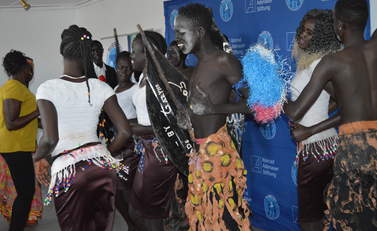September 25, 2018 (KAMPALA) – South Sudanese have been advised to engage in inter-tribal marriages and avoid cultural diversity, a practice regarded as one major cause of its civil war.
The call, barely a month after South Sudan’s warring factions inked a peace agreement to end conflict, came during a gathering of various South Sudanese groups in Uganda on Friday last week.
Dubbed “The South Sudanese inter-cultural dialogue,” the event mainly focused on positive role of cultural diversity in South Sudan and how to use it to make the recently signed peace accord practical.
Donnas Ojok, a Programme Officer at Konrad Adenauer Stifting (KAS), said culture is one of the most underestimated social tools in conflict resolution.
“Cultural diversities can be easily blamed for conflict. But we don’t share this thought. We think that it’s an asset and can help South Sudan to acquire peace. And what this country needs the most is peace!” he said.
In 2013, barely three years after its secession from Sudan, South Sudan witnessed the outbreak of a bloody civil, which has killed tens of thousands of people and displaced millions into neighboring nations.
The involvement of regional leaders, through the Intergovernmental Authority on Development (IGAD), saw a peace deal signed between President Salva Kiir’s government and various rebel factions.
Daniel Joul, lawyer, acknowledges the roles culture plays in societies.
“Different cultures have different values, but all cultural values mean respecting human rights within the context of their own culture. Those cultural values keep us from killing each other,” said Joul, who is also the Executive Director of Joth Mayardit Centre for Peace and Justice.
In South Sudan, he said, the divisions within tribes and various cultures remains a problem, and instead encouraged South Sudanese to start identifying cultural similarities rather than focusing on their differences.
“Right now, our cultures prevent us from pursuing what is best for the whole country. We have turned our politics to matters of cultural conflicts. First we should decide on the similarities, then we can set the law!” stressed Joul, adding that “Therefore, the government should enable an intercultural dialogue as a precondition of democracy!”
Job Anyieth, a South Sudanese anthropologist, said there was no need to force 64 different tribes in South Sudan to conform to singular cultural practices, but rather these tribes can come together in their diversity to work together for peace and progress of the country.”
On the other hand, Grace Andrua, a representative of the South Sudanese Development Agency (SSDA) said there is need to put together a common culture, language and a national dress code.
The event, based on the theme “Cultural diversities in building and promotion of peace in South Sudan,” was organized by KAS in partnership with the International Youth for Africa (IYA), the Network of South Sudan Civil Society Organizations in Uganda (NoSSCOU) and Makerere University South Sudanese Student Association (MUSSSA).





